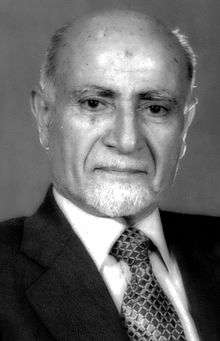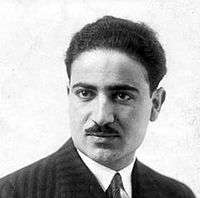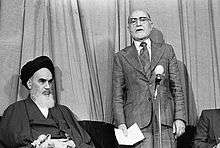Mehdi Bazargan
| Mehdi Bazargan | |
|---|---|
 | |
| 75th Prime Minister of Iran | |
|
In office 4 February 1979 – 6 November 1979[lower-alpha 1] | |
| Deputy |
Ebrahim Yazdi Mostafa Chamran Hashem Sabbaghian Abbas Amir-Entezam Sadeq Tabatabaei |
| Preceded by | Shapour Bakhtiar |
| Succeeded by | Mohammad-Ali Rajai |
| Minister of Foreign Affairs Acting | |
|
In office 1 April 1979 – 12 April 1979 | |
| Prime Minister | Himself |
| Preceded by | Karim Sanjabi |
| Succeeded by | Ebrahim Yazdi |
| Member of the Parliament of Iran | |
|
In office 28 May 1980 – 28 May 1984 | |
| Constituency | Tehran, Rey and Shemiranat |
| Majority | 1,447,316 (67.8%) |
| Personal details | |
| Born |
Mehdi Bazargan 1 September 1907 Tehran, Iran |
| Died |
20 January 1995 (aged 87) Zurich, Switzerland |
| Nationality | Iranian |
| Political party |
National Front (1949–1961) Freedom Movement (1961–1995) |
| Spouse(s) | Malak Tabatabayi |
| Children |
Zahra Abdolali Fataneh Fereshteh Mohammad Navid |
| Alma mater | École Centrale Paris |
| Religion | Shia Islam |
| Signature |
 |
| Website | Official website |
| |
Mehdi Bazargan (Persian: مهدی بازرگان; 1 September 1907 – 20 January 1995) was an Iranian scholar, academic, long-time pro-democracy activist and head of Iran's interim government, making him Iran's first prime minister after the Iranian Revolution of 1979. He resigned his position as prime minister in November 1979, in protest of the US Embassy takeover and as an acknowledgement of his government's failure in preventing it.[1]
He was the head of the first engineering department of University of Tehran. A well-respected religious intellectual, known for his honesty[2] and expertise in the Islamic and secular sciences, he is credited with being one of the founders of the contemporary intellectual movement in Iran.
Early life and education

Bazargan was born into an Azeri family[3][4] in Tehran on 1 September 1907.[5][6] His father, Hajj Abbasquoli Tabrizi (died 1954) was a self-made merchant and a religious activist in Bazaar guilds.[5]
Bazargan was sent by the government to France to receive university education as a scholar of the Reza Shah scholarship fund.[7] He studied thermodynamics and engineering at the École Centrale des Arts et Manufactures in Paris.[8][9][10]
Career
After his graduation, Bazargan voluntarily joined the French army and fought against Nazi Germany.[11] Bazargan then came back from France and became the head of the first engineering department at Tehran University in the late 1940s. He was a deputy minister under Premier Mohammad Mossadeq in the 1950s.[12] Bazargan served as the first Iranian head of the National Iranian Oil Company under the administration of Prime Minister Mossadegh.[13]
Bazargan co-founded the Liberation Movement of Iran in 1961,[12] a party similar in its program to Mossadegh's National Front. Although he accepted the Shah, Mohammad Reza Pahlavi, as the legitimate head of state, he was jailed several times on political grounds.
Iranian Revolution
On 4 February 1979, Bazargan was appointed prime minister of Iran by Ayatollah Khomeini.[14][15] He was seen as one of the democratic and liberal figureheads of the revolution who came into conflict with the more radical religious leaders – including Khomeini himself – as the revolution progressed. Although pious, Bazargan initially disputed the name Islamic Republic, wanting an Islamic Democratic Republic.[16] He had also been a supporter of the original (non-theocratic) revolutionary draft constitution, and opposed the Assembly of Experts for Constitution and the constitution they wrote that was eventually adopted as Iran's constitution. In March 1979, he submitted his resignation due to his government's lack of power to Ayatollah Khomeini.[17] However, Khomeini did not accept his resignation.[17] In April 1979, he and the members of cabinet escaped an assassination attempt.[18]
Bazargan resigned along with his cabinet on 4 November 1979 following the US Embassy takeover and hostage-taking.[1][19] His resignation was considered a protest against the hostage-taking and a recognition of his government's inability to free the hostages, but it was also clear that his hopes for liberal democracy and an accommodation with the West would not prevail.

Bazargan continued in Iranian politics as a member of the first Parliament (Majles) of the newly formed Islamic Republic. He openly opposed Iran's cultural revolution and continued to advocate civil rule and democracy. In November 1982, he expressed his frustration with the direction the Islamic Revolution had taken in an open letter to the then speaker of parliament Akbar Hashemi Rafsanjani.
The government has created an atmosphere of terror, fear, revenge and national disintegration. ... What has the ruling elite done in nearly four years, besides bringing death and destruction, packing the prisons and the cemeteries in every city, creating long queues, shortages, high prices, unemployment, poverty, homeless people, repetitious slogans and a dark future?[20]

His term as a member of parliament lasted until 1984.[4] During his term, he served as a lawmaker of the Iran Freedom Movement, which he had founded in 1961 and abolished in 1990.[4] In 1985, the Council of Guardians denied Bazargan's petition to run for president.
Views
Bazargan is considered to be a respected figure within the ranks of modern Muslim thinkers, well known as a representative of liberal-democratic Islamic thought[21] and a thinker who emphasized the necessity of constitutional and democratic policies.[22] In the immediate aftermath of the revolution Bazargan led a faction that opposed the Revolutionary Council dominated by the Islamic Republican Party and personalities such as Ayatollah Mohammad Hossein Beheshti.[23] He opposed the continuation of the Iran–Iraq War and the involvement of clerics in all aspects of politics, economy and society. Consequently, he faced harassment from militants and young revolutionaries within Iran.[24] Bazargan believes that there is a link and relation between politics and religion but not hokumat.
Attacks
During the Pahlavi era, Bazargan's house in Tehran was bombed on 8 April 1978.[25] The underground committee for revenge, a state-financed organization, proclaimed the responsibility of the bombing.[25]
Laws of social evolution
Bazargan is noted for having done some of the first work in human thermodynamics, as found in his 1946 chapter "A Physiological Analysis of Human Thermodynamics" and his 1956 book Love and Worship: Human Thermodynamics, the latter of which being written while in prison, in which he attempted to show that religion and worship are a byproduct of evolution, as explained in English naturalist Charles Darwin's 1859 Origin of Species, and that the true laws of society are based on the laws of thermodynamics.
Death
Bazargan died of a heart attack on 21 January 1995 in Switzerland.[4] He died at a hospital in Zurich after collapsing at the airport.[4] He was travelling to the United States for heart surgery.[4]
Personal life
Bazargan married Malak Tabatabai in 1939.[5] They had five children, two sons and three daughters.[5]
See also
References
- 1 2 Godsel, Geoffrey (9 November 1979). "Bazargan resignation increases Iran risks to American hostages". The Deseret News. Retrieved 9 November 2012.
- ↑ "World: Yankee, We've Come to Do You In". TIME. 26 February 1979.
- ↑ The Rising Tide of Cultural Pluralism: The Nation-State at Bay?, Crawford Young, p.127, 1993
- 1 2 3 4 5 6 "Mehdi Bazargan, Former Iran Premier, Dies". The New York Times. 21 January 1995. Retrieved 9 November 2012.
- 1 2 3 4 Barzin, Saeed (21 January 1995). "Mehdi Bazargan". The Guardian. Retrieved 22 August 2013.
- ↑ Biography: Mehdi Bazargan BBC Persian 2009
- ↑ Vakili Zad, Cyrus (Spring 1990). "Organization, Leadership and Revolution: Religiously-Oriented Opposition in the Iranian Revolution of 1978-1979". Conflict Quarterly: 5–25. Retrieved 13 February 2013.
- ↑ Sahimi, Muhammad (6 August 2009). "If I Confess...". Tehran Bureau via PBS. Retrieved 18 October 2012.
- ↑ Boroujerdi, Mehrzad (1996). Iranian Intellectuals and the West: The Tormented Triumph of Nativism. Syracuse University Press. p. 190. ISBN 9780815604334. Retrieved 18 October 2012.
- ↑ "Mehdi Bazargan". Encyclopædia Britannica. Retrieved 18 October 2012.
- ↑ "Historic Personalities of Iran: Mehdi Bazargan". Iran Chamber Society.
- 1 2 "Iran's Political Elite". United States Institute of Peace. Retrieved 28 July 2013.
- ↑ Kinzer, Stephen (2003). All the Shah's men : an American coup and the roots of Middle East terror. Hoboken, N.J.: John Wiley & Sons. pp. 93–4. ISBN 0471265179.
- ↑ Martin, Richard C., ed. (2003). Encyclopedia of Islam and the Muslim World. 1. Macmillan Reference USA. p. 106. ISBN 9780028656045.
- ↑ Nikou, Semira N. "Timeline of Iran's Political Events". United States Institute of Peace. Retrieved 27 July 2013.
- ↑ Abrahamian, Ervand (2008). History of Modern Iran. Cambridge University Press. ISBN 9780521821391.
- 1 2 "Bazargan talked out of resigning". The Palm Beach Post. Tehran. 10 March 1979. Retrieved 9 November 2012.
- ↑ "Bazargan escapes assassination try". The Rock Hill Herald. Tehran. AP. 23 April 1979. Retrieved 9 November 2012.
- ↑ Rakel, Eva Patricia (2008). The Iranian Political elite, state and society relations, and foreign relations since the Islamic revolution. University of Amsterdam.
- ↑ "Khomenin's grip appears at its tightest". The New York Times. 21 November 1982.
- ↑ Mahdavi, Mojtaba (2004). "Islamic Forces of the Iranian Revolution: A Critique of Cultural Essentialism". Iran Analysis Quarterly. 2 (2).
- ↑ Barzin, Saeed (1994). "Constitutionalism and Democracy in the Religious Ideology of Mehdi Bazargan". British Journal of Middle Eastern Studies. 21 (1): 85. doi:10.1080/13530199408705593. JSTOR 195568.
- ↑ Behrooz, Maziar (October 1994). "Factionalism in Iran under Khomeini". Middle Eastern Studies. 27 (4): 597–614. doi:10.1080/00263209108700879. JSTOR 4283464.
- ↑ Leicht, Justus (20 November 2001). "Mass trial of opposition group in Iran". World Socialist Website.
- 1 2 Nikazmerad, Nicholas M. (1980). "A Chronological Survey of the Iranian Revolution". Iranian Studies. 13 (1/4): 327–368. doi:10.1080/00210868008701575. JSTOR 4310346.
External links
| Wikimedia Commons has media related to Mehdi Bazargan. |
| Political offices | ||
|---|---|---|
| Preceded by Shapour Bakhtiar |
Prime Minister of Iran 1979 |
Succeeded by Mohammad Ali Rajai |
| Preceded by Karim Sanjabi |
Foreign Affairs Minister of Iran 1979 |
Succeeded by Ebrahim Yazdi |
| Party political offices | ||
| Preceded by None |
Leader of Freedom Movement of Iran 1961–1995 |
Succeeded by Ebrahim Yazdi |